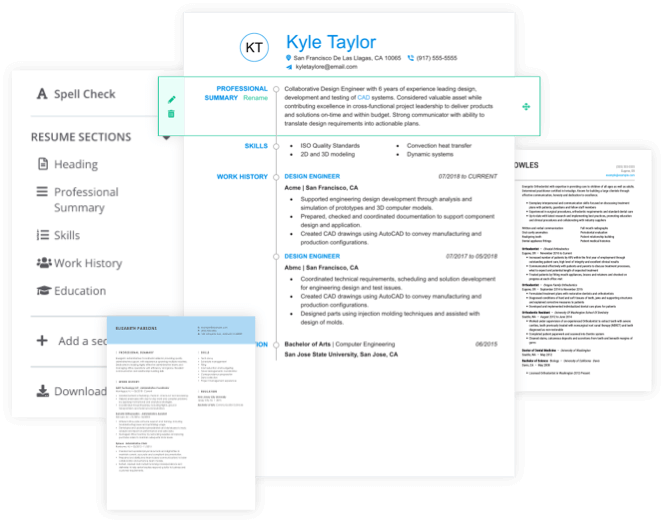- Featured in:

Telecom engineers are experts in electronics who typically specialize in telephone networks or broadband telecommunications. Telecom engineers design or configure voice, video, and data communications systems. A person in this role is also expected to manage installation and post-installation service and maintenance.
A successful telecom engineer should be an analytical problem-solver with strong math skills and prior experience. Job candidates will need a bachelor’s degree in computer science, electrical engineering, information technology, or a related field.
If you are having writers block, our resume examples can help. Choose from hundreds of job titles to find the right example for your needs.
One extra step to impress a manager: A growing number of hiring professionals read cover letters to determine whether they’ll interview a candidate or not. Use our cover letter templates to craft a complete application that lands you the interview.
Telecom Engineer Duties and Responsibilities
While the day-to-day duties of a telecom engineer are determined by their employer, there are many core tasks associated with the role. Based on our analysis of job listings, these may include:
Install Software and Hardware
Telecom engineers install, or coordinate the installation of, new or modified hardware, software, or programming modules of telecommunications systems.
Monitor and Test Systems
It is expected that these engineers test and evaluate hardware and software to determine efficiency, reliability, and compatibility with existing systems, networks, and data. Telecom engineers also monitor and analyze system performance, such as network traffic, security, and capacity, to proactively identify service-impacting issues.
Manage Projects
Telecom engineers manage large projects requiring telecommunication services, ensuring timely planning and implementation. Duties include changing priorities and tasks to most effectively match a varied grouping of skills to fit customer needs. Telecom engineers are also expected to resolve complex and escalated network and telecom service issues in a timely manner to support internal and external customer requests and needs.
Create and Maintain Documentation
To ensure proper protocols and processes are in place, telecom engineers produce, update, and generally improve technical documentation to support security requirements and operational support of systems.
Telecom Engineer Skills and Qualifications
Successful telecom engineers are analytical problem-solvers. They think proactively to stay ahead of issues that may arise. They are well organized and thrive in fast-paced, high-stress environments. Additionally, employers prefer candidates who possess the following abilities:
Communication skills – it is crucial that a person in this role has the ability to communicate network security issues to peers and management clearly and effectivel
Adaptability – telecom engineers typically work as a member of several teams, which requires flexibility and adaptability. Candidates interested in this role should be collaborative and comfortable working both individually and with larger groups
Problem-solving skills – it’s the job of the telecom engineer to solve problems. Software, network, and data incidents can happen at any time and it’s expected that these engineers will research, escalate, and resolve issues effectively
Analytical thinking – efficiently identifying and analyzing problems of existing telecommunications systems and determining the most effective ways of reducing and eliminating future problems for improved communication levels is crucial to the success of a telecom engineer
Telecom Engineer Education and Training
A bachelor's degree in a field such as electrical engineering, computer science, software engineering, systems engineering, or information systems is typically required to work in this career. Some positions require up to five to 10 years of experience as well. The Society for Cable Telecommunications Engineers recommends that telecommunications engineers pursue continuing education courses to advance their careers and keep current with industry trends. Hands-on training, especially for specific processes and the company’s software, is typically offered by employers.
Telecom Engineer Salary and Outlook
The Bureau of Labor Statistics (BLS) categorizes telecom engineers under a broader category of electrical and electronics engineers. The median annual wage for electrical engineers is $95,060. The median annual wage for electronics engineers is $102,180.
Overall employment of electrical and electronics engineers is projected to grow 7 percent through 2026, about as fast as the average for all occupations. The change in employment is expected to be tempered by slow or declining growth in most manufacturing industries that employ electrical and electronics engineers.

Helpful Resources
Telecommunications Crash Course
this book was fully revised to address the convergence of the telecom, media, and technology (TMT) sectors. The new edition of this cutting-edge guide provides a comprehensive overview of the current telecom landscape. The content focuses on the interdependence of IT infrastructure, multimedia content, and broadband transport network in today's hyper-connected mobile environment
The Telecommunications Industry Association
TIA is the leading trade association representing the global information and communications technology (ICT) industry through standards development, policy initiatives, business opportunities, market intelligence, and networking events. With support from hundreds of members, TIA enhances the business environment for companies involved in telecom, broadband, mobile wireless, information technology, networks, cable, satellite, unified communications, emergency communications and the greening of technology
The Essential Guide to Telecommunications
writing in plain language, the author demystifies today’s most significant technologies, standards, and architectures
Fierce Telecom
this website is an invaluable resource that provides the latest news on telecom companies, backhaul, Ethernet, IPTV, and many other telecom trends
TelcoProfessionals
this is a great site to network with other professionals in the industry. Resources include news, blogs, summits, and an active community of experts




